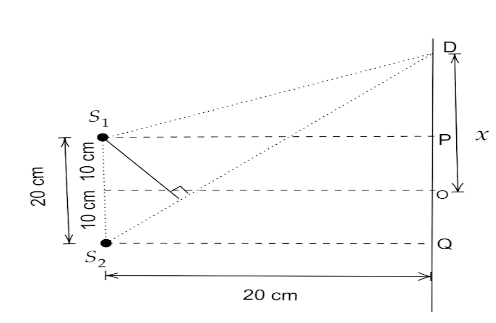Question
Question: Two sources of sound \({S_1}\) and \({S_2}\), emitting waves of equal wavelength \(20.0{\text{ }}cm\...
Two sources of sound S1 and S2, emitting waves of equal wavelength 20.0 cm, are placed with a separation of 20.0 cm between them. A detector can be moved on a line parallel to S1S and at a distance of 20.0 cm from it. Initially, the detector is equidistant from the two sources. Assuming that the waves emitted by the sources are in phase, find the minimum distance through which the detector should be shifted to detect a minimum of sound.
Solution
First of all we have to construct a figure. We have to assume that the waves meet at D which is x distance from O. From geometry we have to find the path difference. Also from the minimum condition of waves we have to find path differences. After that by equating both terms we will eventually have our result.
Complete step by step answer:

From the given figure we have to find out the phase difference Δx. According to given data λ=20cm and distance between DQ and S1S2 is 20cm also S1S2=20 cm. Let the distance between D and o is x cm.
Then PD=(x−10) and QD=(x+10)
From ΔS1PD and ΔS2QD we get,
S1D=(S1P)2+(PD)2 from Pythagoras Theorem,
⇒S1D=(20)2+(x−10)2 and
⇒S2D=(S2Q)2+(QD)2
⇒S2D=(20)2+(x+10)2
The path difference Δx is,
Δx=S2D-S1D
⇒Δx=(20)2+(x+10)2−(20)2+(x−10)2−−−−−(1)
Path difference is defined as,
Δx=2(2n+1)λ
For minima, n=0
∴Δx=2λ
Substituting the value λ we get,
Δx=220=10−−−−(2)
From equation (1) and (2) we get,
(20)2+(x+10)2−(20)2+(x−10)2=10
⇒(20)2+(x+10)2=10+(20)2+(x−10)2
Squaring both sides we get,
400+x2+100+20x=100+400+x2−20x+100+20(20)2+(x−10)2
By eliminating some terms we get,
40x−100=20(20)2+(x−10)2
Again, squaring both sides we get,
1600x2+10000−8000x=400(500+x2−20x) ⇒1200x2=200000
Now the value of x=12.9
Hence, the minimum distance through which the detector should be shifted to detect a minimum of sound is 12.9 cm.
Note: We must use Pythagoras Theorem in the above figure. While solving the equations we must be sure that we do not cancel out any value of variable. For a minimum condition the value of n=0.We have to assume that the waves meet xdistance from the midpoint of detector DQ.
